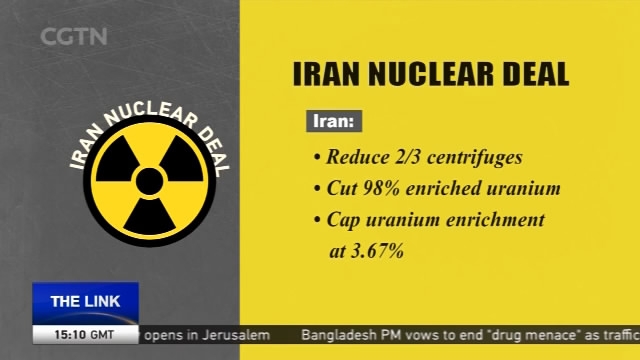
08:49, 22-May-2018
Iran Nuclear Deal: The terms of the 2015 Iran nuclear agreement
01:36

CGTN's Chuck Tinte takes us a quick look at what the nuclear deal involves.
The landmark agreement was signed by Iran and six other nations in 2015. It limits Iran's nuclear program and imposes the world's strictest ever inspections regime in exchange for lifting sanctions.
According to the deal, Iran dramatically reduced the number of its centrifuges, cut 98% of its stocks of enriched uranium, and capped uranium enrichment at 3.67%.
Iran limits its uranium research and development, and allows inspectors from the International Atomic Energy Agency access to all its nuclear facilities.
In return, all nuclear-related sanctions were to be lifted at the beginning of 2016 and Iran's economy would be reconnected to international markets.
After the deal, Iran shipped out almost all its low-enriched uranium and has a 300 kilograms limit for 15 years. It also destroyed a heavy water plant. Despite IAEA assurances that Iran was in full compliance, Trump has now quit the deal. The UK, France, and Germany responded with a joint statement, expressing "regret and concern". They've joined China and Russia in criticizing the withdrawal and agreeing to preserve the deal. Iran's rivals Israel, Saudi Arabia, the UAE and Bahrain have all applauded Trump's decision.

SITEMAP
Copyright © 2018 CGTN. Beijing ICP prepared NO.16065310-3
Copyright © 2018 CGTN. Beijing ICP prepared NO.16065310-3